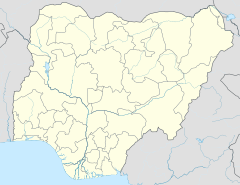Parts of this article (those related to the extent and casualties of the attack and its aftermath, particularly those dealing with refugees) need to be updated. (February 2015) |
| 2015 Baga massacre | |
|---|---|
| Part of Islamist insurgency in Nigeria | |
Location of Baga in Nigeria | |
| Location | Baga, Borno State, Nigeria |
| Coordinates | 13°7′7.7″N 13°51′23.7″E / 13.118806°N 13.856583°E |
| Date | 3–7 January 2015 |
| Target | Local residents, Nigerian Army base in town |
Attack type | Mass killing, spree killing, petrol bombing, others |
| Deaths | 150–2,000+[1] |
| Perpetrators | Boko Haram |
The 2015 Baga massacre was a series of mass killings carried out by the Boko Haram terrorist group in the north-eastern Nigerian town of Baga and its environs, in the state of Borno, between 3 January and 7 January 2015.
The attack began on 3 January when Boko Haram overran a military base that was the headquarters of the Multinational Joint Task Force containing troops from Chad, Niger, and Nigeria. The militants then forced thousands of locals from the region and committed mass killings that culminated on the 7th.
Fatalities have been reported to be "heavy" but their extent is unclear. Western media outlets reported that "over 2,000" people are thought to have been killed or "unaccounted for", but local media reported "at least a hundred" fatalities, while the Nigerian Ministry of Defence said that no more than 150 people in total had been killed, including militants.[2][3][4][5] Several government officials denied that the fatalities were as extensive as reported, with some even claiming that the massacre had never taken place or that the Nigerian military had repelled the militants from the region, a claim that was refuted by local officials, survivors, and the international media.[4][6][7]
Baga and at least 16 other towns are thought to have been destroyed as over 35,000 people are reported to have been displaced, with many feared to have drowned while trying to cross Lake Chad and others trapped on islands in the lake.[2][5] The attacks are said to have resulted in Boko Haram extending its control to over 70% of Borno State, while its leader, Abubakar Shekau, claimed responsibility for the massacre in a video statement, saying that they "were not much" and that the group's insurgency "would not stop".[3][8]
- ^ Cite error: The named reference
HRWwas invoked but never defined (see the help page). - ^ a b Cite error: The named reference
AFP_BIwas invoked but never defined (see the help page). - ^ a b "Boko Haram crisis: Nigeria's Baga town hit by new assault". BBC World News. BBC. 8 January 2015. Retrieved 8 January 2015.
- ^ a b Smith, Alexander (8 January 2015). "Boko Haram Torches Nigerian Town of Baga; 2,000 Missing: Senator". NBC News. Retrieved 8 January 2015.
- ^ a b "Boko Haram kills dozens in fresh raids in Nigerian town". Reuters. 8 January 2015. Archived from the original on 2 February 2016. Retrieved 8 January 2015.
- ^ Cite error: The named reference
Sun_1was invoked but never defined (see the help page). - ^ Cite error: The named reference
News_Express_1was invoked but never defined (see the help page). - ^ "Boko Haram claims Baga massacre and threatens Nigeria's neighbours". The Guardian. 22 January 2015. Retrieved 4 February 2015.
